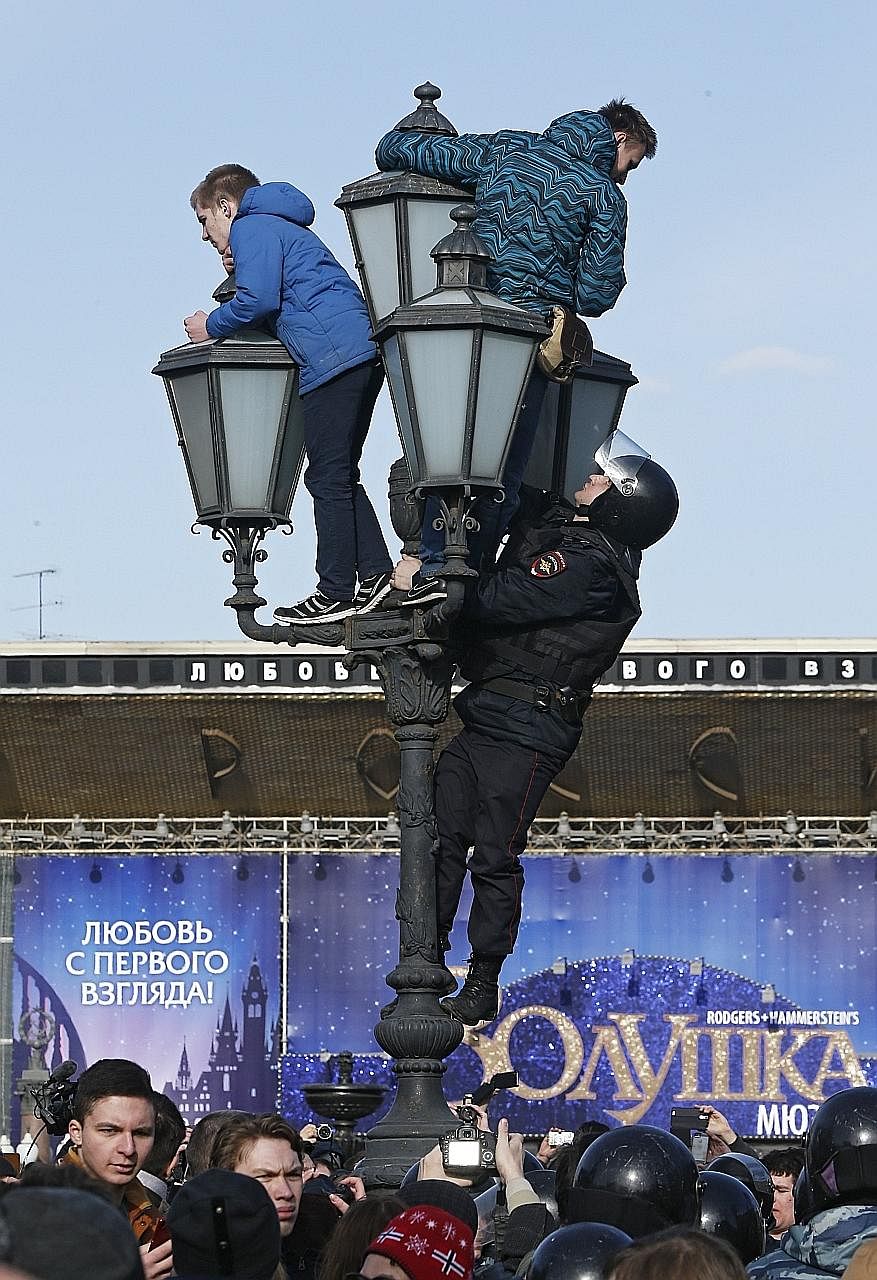MOSCOW • At the age of 16, Darya Moroz is too young to vote in Russia. But she sneaked out to join the opposition protest in Moscow on Sunday - without telling her parents.
"I didn't tell them because I was afraid of arguments," she said after she came out to support opposition leader Alexei Navalny. "I just said I was going for a walk."
She was not alone.
The unauthorised protest in Moscow drew an unprecedented number of students and others born after President Vladimir Putin came to power in 2000, and who have known only his rule.
"There were a lot of young people detained, aged 17 or 18," said lawyer Oleg Yeliseyev, who helped three teenagers get released without charges from police stations.
"This is the first time in Russia basically. The protesters are getting younger," he added.

A spokesman for OVD-Info, a group that monitors police detentions in Moscow, said: "We don't have exact statistics, but there were really a lot of minors and students.
"In each of the police stations, there were at least two or three teenagers. That didn't happen before."
Mr Navalny, with his social networking savvy and readiness to send tweets even from a courtroom, is far ahead of other Russian politicians.
His approach appeals to the Internet generation that neither watches state television nor has first-hand memories of the 1990s - a decade that is considered as one of economic and political chaos that preceded the "stability" of the Putin era.
In court on Monday, Mr Navalny told journalists he wanted to thank high school and university students for taking part in the protest.
"I'm really happy that a generation has been born in the country who want to be citizens, who aren't afraid," he said.
But Kremlin spokesman Dmitry Peskov accused Mr Navalny of "consciously deceiving minors, children basically", by encouraging them to attend an unsanctioned rally.
Mr Peskov claimed Mr Navalny had offered "financial rewards" to minors if they were detained, though he gave no evidence to back up his assertion.
A YouTube video posted on Sunday by a nationalist news site shows a young boy apparently in a police van saying Mr Navalny had promised that the European Court of Human Rights would pay €10,000 (S$15,000) in compensation for each detention. The video has been viewed 50,000 times as of Monday.
-
76%
Percentage of people polled that backed schoolchildren taking part in protests. The poll was by opposition-leaning Ekho Moskvy radio station on Monday.
Darya, who is studying computer programming at university, said she decided to join the protest after Mr Navalny's anti-corruption group released a video expose linking Prime Minister Dmitry Medvedev to a vast property empire.
She said she was shocked that the authorities did not react.
"The only thing that happened was that Mr Medvedev blocked Mr Navalny on Instagram. I was gobsmacked, basically. In our country, there are no answers, no attempts to refute anything, nothing," she said.
She went to the protest with a friend, Mr Vlad Korostelev, a 19-year-old computer security student.
They said police pulled their friends from the crowd on the central Pushkin Square and hauled them into police vans.
Riot police "pulled people out at random... people who weren't holding posters or doing anything," said Mr Korostelev.
Darya said she was "scared for myself and them".
"A lot of people are very young and they have never been in that situation, they didn't know what to do, they were just in a panic. It's scary to live in this country and you need to try to fight this, because it's totally out of line," she said.
A poll on Monday by the opposition-leaning Ekho Moskvy radio station found that 76 per cent of respondents backed schoolchildren taking part in protests.
AGENCE FRANCE-PRESSE
